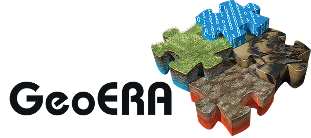David Boon, 2 March 2020
Field surveys for promoting sustainable geothermal energy use
The decarbonisation of urban heating using ground source heat pumps will require significant deployments of shallow geothermal technologies including vertical closed loop (borehole heat exchangers) and open loop systems (thermal groundwater use). Optimised usage and sustainable management of the heat resource under cities will require a ‘thermal stewardship’ approach, achieved by developing an awareness of existing subsurface infrastructure and thermal fluxes, and built on a good understanding of the local geology, hydrogeology and ground conditions.
Work in the Cardiff pilot area between March 2019 and March 2020 included:
- Geological and geophysical investigations: Approval of 3D Superficial Geology Mapping (upper 50m) with the addition of a ‘made ground’ layer. The model layers, shown in Figure 1, will enable preparation of a ‘shallow geothermal opportunities map’.
Additional fieldwork was undertaken in February 2020 at a planned open loop geothermal district-heating scheme in Essex. Survey methods included borehole geophysical logging (fluid temperature and conductivity, gamma, calliper, point resistance and optical imaging) and a Microtremor/passive seismic survey (Figure 2). Stakeholders from the environmental regulator visited the site to discuss urban geothermal energy management and permitting. - Environmental monitoring in borehole network: groundwater temperature monitoring in the shallow Glaciofluvial gravel aquifer. The new data acquired will now be compared against baseline of Farr at al. (2017) to analyse anthropogenic and climate change signals. The baseline data is publicly available in a report through the UKGEOS project website. Follow this link to find the data.
- Groundwater Modelling: Will enable simulation of thermal interaction between multiple GSHP schemes.
- Environmental and efficiency monitoring of a shallow open loop ground source heat pump system.
- Analysis of core physical properties from pilot region.
Groundwater Monitoring Network
An important addition to the groundwater monitoring network in 2019/20 was a new groundwater monitoring well installed in the glacial gravel aquifer at Taffs Well. The well is located at the northern boundary of the aquifer in a deep rock-cut gorge next to the River Taff. Taff’s Well has been famous since Roman times for its natural upwelling of 21°C spring water. The legend finds new fame after a recent announcement that this thermal spring will soon supply low-temperature direct space heating for a new school and existing community centre.
Groundwater modelling
We aim to use numerical modelling to estimate heat advection in the shallow aquifer in Cardiff, for which we have developed a groundwater recharge model and a groundwater model. A spatially distributed recharge model is developed using model drivers such as rainfall, evapotranspiration, soil characteristics, topography and high-resolution land use. This groundwater recharge drives a groundwater model of the shallow urban aquifer, considering interactions with surface water such as rivers, the coast, the Cardiff Bay barrage and docks; groundwater abstraction as part of the groundwater control systems; and groundwater ingress into the sewer network. We find that the groundwater levels at a city scale cannot be adequately simulated without the inclusion of groundwater losses to the sewer network. Next steps will include the development of a heat flow model including interactions with surface water and the sewer network, in order to estimate the ground temperatures under different scenarios of heat abstraction.
For more information about the survey, please contact:
David Boon, dboon@bgs.ac.uk




Older MUSE posts:
- Pilot area activities – #8 Hydrogeological and geothermal surveys in Ljubljana, Slovenia
- Pilot area activities – #7 New construction of a shallow geothermal installation in Prague, Czech Republic
- Pilot area activities – #6 Groundwater monitoring in Girona, Catalonia, Spain
- Pilot area activities – #5 Geothermal data analysis in Aarhus, Denmark
- Pilot area activities – #4 Geothermal data collection in Cork City, Ireland
- Pilot area activities – #3 Groundwater monitoring in Zaragoza, Spain
- Pilot area activities – #2 Geological and geophysical surveys in Linköping, Sweden
- Pilot area activities – #1 Groundwater monitoring in Vienna, Austria
- Geophysical survey in Anderlecht
- MUSE team meeting in Cardiff, UK
- Knowledge Exchange Workshop of MUSE and HotLime projects held in Zagreb
- MUSE leaflet available now
- The MUSE team met in Essen, Germany
